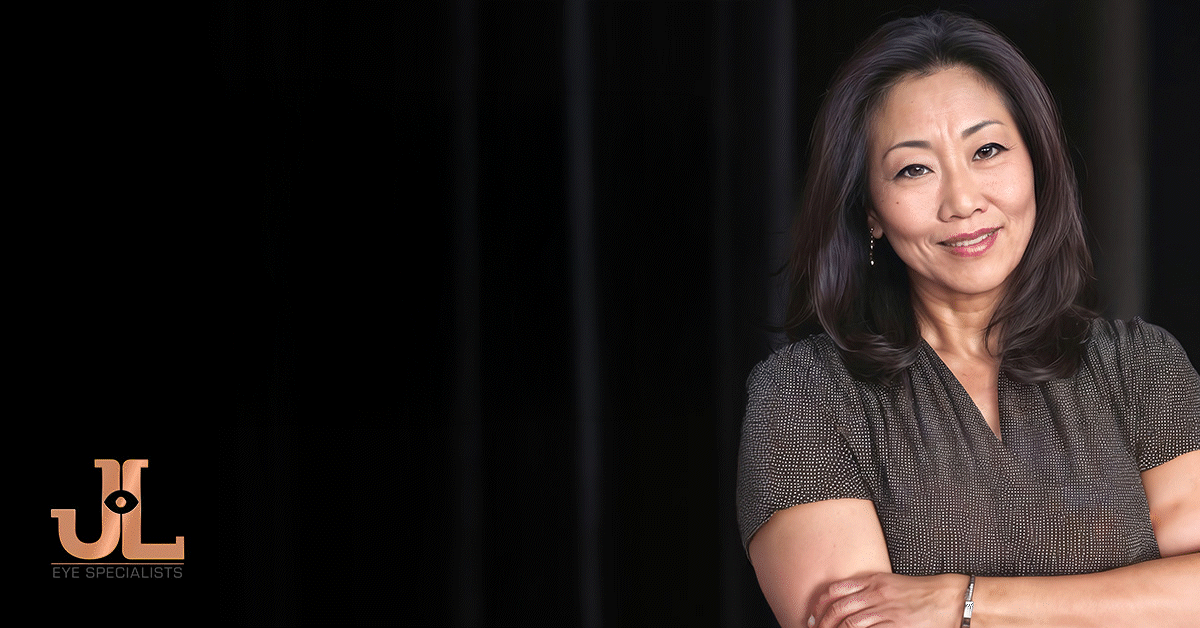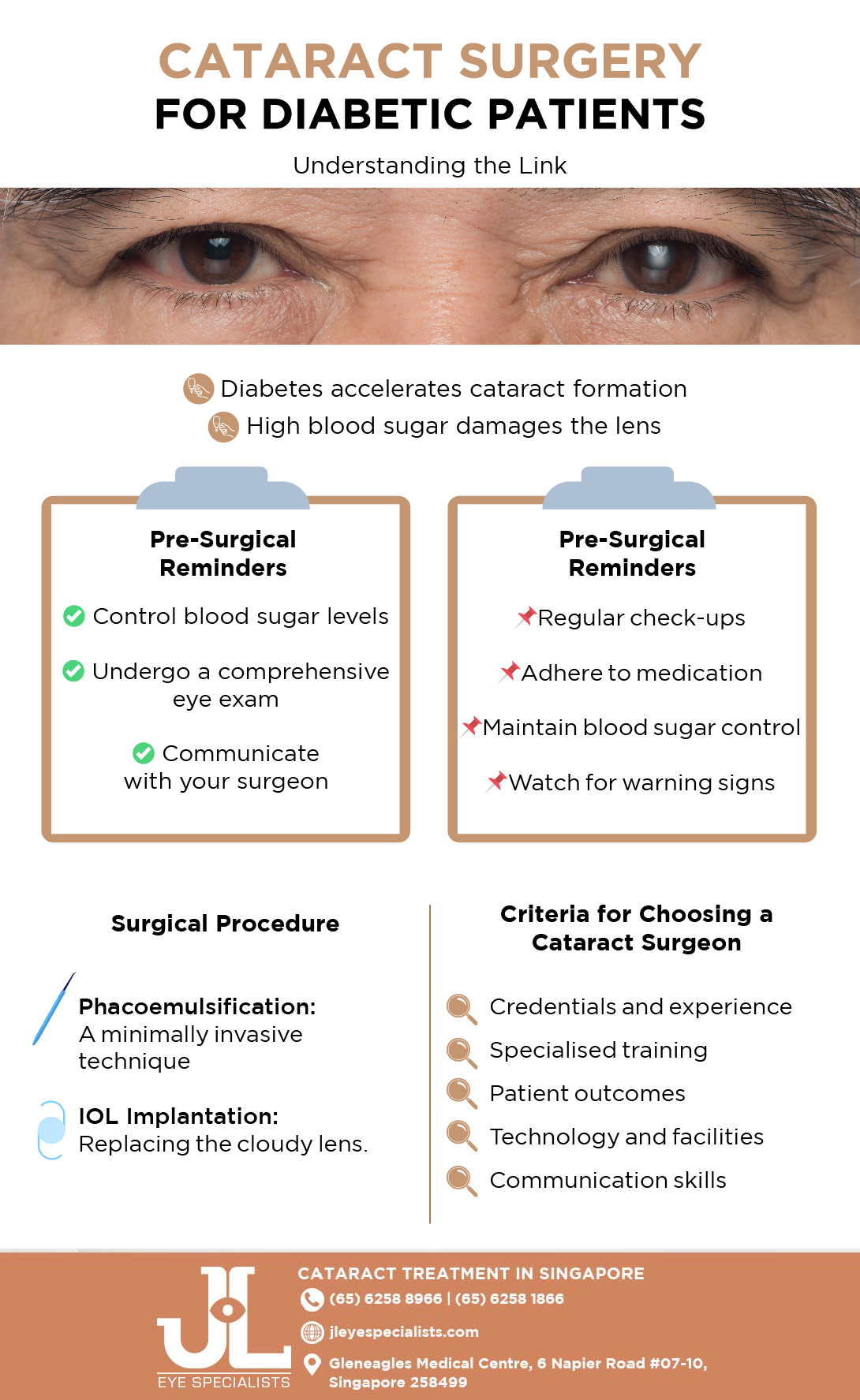Cataract Surgery for Diabetic Patients: What You Need to Know

Diabetes impacts over 440,000 individuals in Singapore, a number that continues to grow each year, posing significant health challenges, particularly in terms of eye health. Among these challenges, diabetic patients face a substantially increased risk of developing cataracts at an earlier age compared to the non-diabetic population. While cataract surgery is one of the most commonly performed surgeries worldwide, with a high success rate, the procedure requires careful consideration and tailored care for those managing diabetes.
This blog post explores essential aspects of cataract surgery for diabetic patients, providing you with vital information to navigate your treatment options effectively. We’ll answer crucial questions that many diabetic patients contemplating cataract surgery might have. From understanding the risks involved to knowing the recovery nuances, this article aims to equip you with the knowledge needed to make informed decisions about your eye health
Understanding the Connection: Diabetes and Cataracts
Diabetes impacts over 440,000 individuals in Singapore, a number that continues to grow each year, posing significant health challenges, particularly in terms of eye health. Among these challenges, diabetic patients face a substantially increased risk of developing cataracts at an earlier age compared to the non-diabetic population. While cataract surgery is one of the most commonly performed surgeries worldwide, with a high success rate, the procedure requires careful consideration and tailored care for those managing diabetes.
This blog post explores essential aspects of cataract surgery for diabetic patients, providing you with vital information to navigate your treatment options effectively. We’ll answer crucial questions that many diabetic patients contemplating cataract surgery might have. From understanding the risks involved to knowing the recovery nuances, this article aims to equip you with the knowledge needed to make informed decisions about your eye health.
Can I Have Cataract Surgery If I Have Diabetes?
While individuals with diabetes are generally eligible for cataract surgery, there are considerations to take into account. It’s because diabetes can increase the risk of cataract development at an earlier age and can also influence the surgery outcomes due to potential complications related to fluctuating blood sugar levels.
- Preoperative Care. Before surgery, it’s essential for diabetic patients to manage their blood sugar levels effectively. Stable blood glucose helps minimise the risk of postoperative complications such as infections or delayed healing. Ophthalmologists typically collaborate with the patient’s primary care physician or endocrinologist to ensure that diabetes is well-managed in the perioperative period.
- Surgical Considerations. During the surgery, special attention is given to minimise stress and potential fluctuations in blood sugar levels. The surgeon might use specific techniques or take additional precautions to address the potential for more pronounced inflammation or other ocular issues that are more common in diabetic patients.
- Postoperative Care. After surgery, diabetic patients need careful monitoring as they are at a higher risk of developing certain complications like macular edema, which can affect visual outcomes. Follow-up appointments are crucial to monitor the healing process, and adjustments in diabetic treatment might be necessary.
By ensuring that diabetes is well-managed and by taking specific surgical and postoperative steps, diabetic patients can successfully undergo cataract surgery with good outcomes.
Will Cataract Surgery Cure My Diabetic Retinopathy?
Cataract surgery will not cure diabetic retinopathy. Cataract surgery is effective in removing the cloudy lens from your eye to improve vision clarity. But it does not address the underlying retinal issues caused by diabetic retinopathy.
Diabetic retinopathy involves damage to the blood vessels of the retina, the light-sensitive tissue at the back of the eye. It is a complication of diabetes that can lead to vision impairment or blindness if not managed properly. Cataract surgery, on the other hand, focuses solely on the lens of the eye and improves vision affected by the cataract.
After cataract surgery, it’s crucial to continue regular check-ups with an eye specialist who can treat diabetic retinopathy through methods like laser treatment, injections, or surgery specifically designed to stabilise or improve the condition of the retina. Patients with both conditions should maintain an ongoing treatment plan for diabetes and its ocular complications.
What are the Risks of Cataract Surgery for Diabetic Patients?
Cataract surgery is generally safe and effective, but diabetic patients face a slightly higher risk of complications due to the systemic nature of their condition. Understanding these risks can help in better preparation and management post-surgery. Diabetic patients are more susceptible to certain complications from cataract surgery, including:
- Postoperative Infections: Diabetics have a higher risk of infections due to diminished immune response, which can complicate the recovery process.
- Macular Edema: This condition, characterised by swelling in the central part of the retina, is more common in diabetic patients after surgery and can affect visual outcomes.
- Slower Healing: Elevated blood sugar levels can interfere with the healing process, potentially leading to prolonged recovery times and complications.
To mitigate these risks, it’s essential that diabetic patients maintain good glycemic control before and after surgery to support healing and reduce risks. Close monitoring by the eye care team is crucial to detect and treat any postoperative complications early. Coordination with the patient’s diabetes care team can help manage blood sugar levels and overall health more effectively.
How Long is the Cataract Surgery Recovery Time for a Diabetic Patient?
Recovery from cataract surgery typically varies from person to person, and diabetic patients may experience a slightly longer recovery period due to their unique health challenges. Understanding the factors that influence recovery can help diabetic patients prepare and manage their post-surgical healing more effectively.
FACTORS INFLUENCING RECOVERY
- Blood Sugar Levels: Stable blood sugar levels are crucial for diabetic patients recovering from any surgery, including cataract surgery. Fluctuations in glucose levels can slow down the healing process and increase the risk of complications.
- Severity of Diabetic Retinopathy: Diabetic patients with retinopathy might experience more complications during recovery, such as swelling or bleeding in the eye. This can prolong the healing process and necessitate additional treatments or follow-up visits.
- Overall Health and Diabetes Management: The better controlled a patient’s diabetes is, the smoother the recovery tends to be. Good management of diabetes and general health prior to surgery contributes to faster healing and reduces risks.
TYPICAL RECOVERY TIMELINE
While most patients notice an improvement in vision shortly after cataract surgery, the complete healing process can take several weeks. For diabetic patients, this timeline might be extended, depending on the factors mentioned above. Here’s a general overview:
- First 24 to 48 Hours. Initial recovery from anaesthesia and adaptation to visual changes. Diabetic patients should monitor for excessive pain or any signs of infection.
- First Few Weeks. During this period, patients will typically have several follow-up appointments to monitor their progress. It’s essential to use prescribed eye drops to reduce inflammation and prevent infection.
- One to Three Months. By this stage, most patients will have achieved stable vision. However, diabetic patients should continue to monitor for late-onset complications like macular edema.
POSTOPERATIVE CARE TIPS
- Avoid Strenuous Activities: To prevent increases in eye pressure that could harm the surgical site.
- Protect Your Eyes: Use sunglasses to protect from bright lights and debris.
- Maintain Good Glycemic Control: Work with your diabetes care team to keep your blood sugar levels stable throughout the recovery period.
While the recovery from cataract surgery is generally straightforward, diabetic patients may require additional time and care. By taking proactive steps to manage diabetes and closely following their doctor’s postoperative instructions, diabetic patients can enhance their recovery and enjoy the benefits of improved vision after cataract surgery.
Cataract Surgery for Diabetic Patients in Singapore
At JL Eye Specialists, we recognize that each patient has unique needs and concerns. Our commitment is to provide personalised care tailored to address each individual’s specific eye health requirements. And we understand the extra care that’s needed by patients with diabetes who require cataract surgery.
Dr. Lim Wei Kheong Jimmy, MBBS, MMed (Ophth), MRCSEd (Ophth), FRCSEd (Ophth), FAMS, is the Medical Director and Senior Consultant at JL Eye Specialists. Dr. Lim specialises in general ophthalmology, cornea, refractive (LASIK), and cataract surgery. Before founding his private practice, he was a Senior Consultant and Deputy Head of Cornea and Refractive Surgery at the National Healthcare Group Eye Institute at Tan Tock Seng Hospital. With over two decades of experience, Dr. Lim has provided exemplary eye care to both local and international patients, establishing himself as a trusted expert in his field.
Please do note that the information provided in this blog is for educational and informational purposes only and should not replace professional medical advice from a qualified healthcare provider. If you or someone you know is seeking advice or treatment for cataracts, we encourage you to contact us at 6258-8966 to schedule a consultation.
Related Post:
More Topics to Explore:
Relevant Services:
Our Doctor

DR. JIMMY LIM
Dr. Jimmy Lim is a top ophthalmologist for cataract eye surgery in Singapore, offering over 20 years of expertise in cataract treatment and management.
Gleneagles Medical Centre
6 Napier Road #07-10,
Singapore 258499
Phone: +65 6258 8966
Fax: +65 6258 8766
FAQs on Cataract Surgery for Diabetic Patients
Yes. Diabetic patients can safely undergo cataract surgery when blood sugar levels are well controlled and the procedure is performed by an experienced ophthalmologist.
Cataract surgery can restore clearer vision but does not treat diabetic retinopathy or macular oedema. Regular eye exams remain important to manage diabetes-related eye conditions.
Diabetics have a slightly higher risk of slower healing or retinal swelling. Careful blood sugar control and follow-up visits help reduce these risks and ensure safer recovery.
Most patients notice clearer vision within days, but full healing may take a few weeks. Diabetic patients should follow medical advice closely to support proper recovery.
Ensure your blood sugar is stable before surgery and share your full medical history with your doctor. Proper preparation helps achieve safer, more predictable outcomes.

JL Eye Specialists is an ophthalmology clinic in Singapore that specialises in general ophthalmology, cornea, refractive (LASIK), and cataract surgery.
To cover the expenses that you may incur, we accept several corporate and international insurance policies. If you have any of the insurance plans at this side, please let us know when you schedule an appointment with us. For more questions, feel free to contact us at +65 6258 8966.





